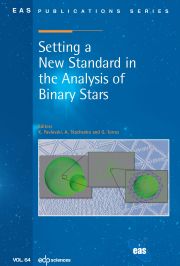No CrossRef data available.
Article contents
Effects of atmospheric turbulence on the GENIE nulling interferometer
Published online by Cambridge University Press: 11 October 2004
Abstract
Two competitive design studies for the Ground-based European Nulling Interferometer Experiment(GENIE) have recently been initiated by the European Space Agency and the European SouthernObservatory. A major issue in these studies is the influence of atmospheric turbulence on theperformance of the instrument, and how atmospheric effects can be compensated in order to reach thegoal performance (detection of faint exozodiacal clouds). In this paper, we review the mainatmospheric processes affecting a nulling interferometer and discuss possible ways to reduce themby means of real-time control systems. Preliminary performance estimates of GENIE are thenpresented. The effects of the thermal background and its fluctuations (Absil & Bakker 2004) are notconsidered here.
- Type
- Research Article
- Information
- European Astronomical Society Publications Series , Volume 12: Astronomy with High Contrast Imaging II , 2004 , pp. 245 - 253
- Copyright
- © EAS, EDP Sciences, 2004


